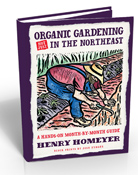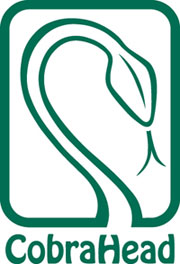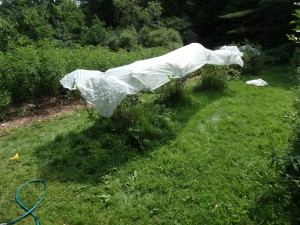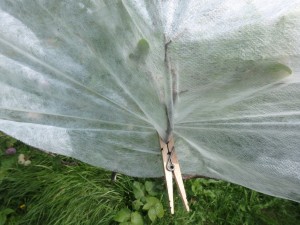Are Blueberries For the Birds? Or For Us?
I gave a lecture and slide show recently about good plants that support our feathered friends. I talked about good habitat for nesting and safe places to rest while avoiding cats. But when I showed plants birds like to eat, some gardeners were surprised when I showed blueberries: they didn’t want to share. Many of those same people buy black oil sunflower seeds in 50 pound bags every month all winter. But share the blueberries? No way. If you don’t want to share, let’s look at the options.
Years ago when I was in the category of “blueberries are for me, not the birds” I developed an easy netting system that kept the birds off – but I no longer use it. Netting allows the birds to see those ripe berries, taunting them if you will, and some will get caught in the netting trying to get in. A friend recently reported finding 3 dead and rotting birds in the blueberry netting of a friend who was away. I haven’t used nets in years.
But let’s assume you want to net and are willing to check the nets frequently for caught birds. I suggest using tall plastic hoops that will allow you to drape wide swaths of netting over the bushes and easily slide it off to pick.
Buy 10 foot lengths of PVC pipe that is ¾ inches in diameter. For smaller bushes, cut some pipes in half and glue them to full length pieces to produce 15 foot long pipes. For large mature bushes, use 2 full lengths. Every 10 feet of a row of blueberries needs a hoop. Just bend the pipe to make a hoop, and push into the soil. I kept the netting in place with hair clips, the kind with 2 rows of teeth and a spring. On the ground I used landscape staples to hold the netting down and keep birds out.
I called my buddy Chris Dye of Noda’s Blueberry Farm in Meriden, NH (www.nodafarm.com). He said they bought a noise maker to keep the birds at bay. It’s called a Bird Gard Pro. (http://www.birdcontrolpro.com
Then I called Riverview Farm in Plainfield, NH and talked to Nancy Franklin. She and her husband have a huge fruit operation – apples, blueberries, raspberries, pumpkins and more (http://www.riverviewnh.com/). Nancy said that their berries are mostly late-season varieties, especially one called ‘Elliot’. By the time they are ripe, many of the bird culprits are getting ready to migrate and have changed their feeding habits, and are less of a problem. So they share a few, but don’t lose too many.
One problem with late-season berries whether blueberries, raspberries or strawberries is a new pest that arrived a few years ago: the spotted winged drosophila, a foreign fruit fly. Unlike our native fruit flies, this one attacks good fruit, not rotten fruit. So I don’t recommend any late season varieties until someone develops a predator insect that will control this new pest.
Birds evolved to avoid large predatory birds like owls and hawks. So you can buy a plastic owl and put him out in your blueberry patch, but birds aren’t stupid. Unless you are going to move it from tree to tree, they’ll figure out it’s not real.
Birds don’t like shiny things, either. I’ve known gardeners to hang old music CD’s they no longer enjoy in the bushes. The wind blows them, and they shine light at the birds. But then again, in time, they might start rocking to “Grandma Got run Over by a Reindeer” instead of flying away.
I also have some Nite Guard Repellent tape. This is shiny tape designed to scare birds with movement, noise and light (http://www.niteguard.com/). At $15 for a 100 foot roll, it is affordable – and probably helps.
I have a bumper crop of blueberries ripening up now on my 7 bushes. I attribute that to the fact that I have been spreading agricultural sulfur around the bushes for a few years, getting the soil very acidic. Soil pH is very important, and you can add sulfur any time. But don’t add acidic fertilizer now (Holly-Tone, for example) as that should be done in early June. Fertilizer now would stimulate new growth which could easily be damaged in winter.
So this year I decided to put Reemay or “row cover” over my bushes. It’s a light-weight agricultural fabric designed to keep bugs off crops. I keep it in place with ordinary wooden clothes pins. It only cover the top of the bushes, or a little of the sides, but birds flying over won’t see it. And if my resident robins want to go on the ground and pick up berries, why not? There is nothing to harm the birds, and it is an inexpensive, quick–to-install solution. So put me in the category of “willing to share – a little – with the birds.”
See Henry’s twice-a-week blog at www.dailyuv.com/gardeningguy. He is the author of 4 gardening books, and a lifetime UNH MasterGardener.




